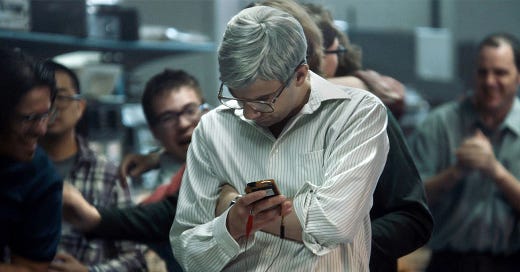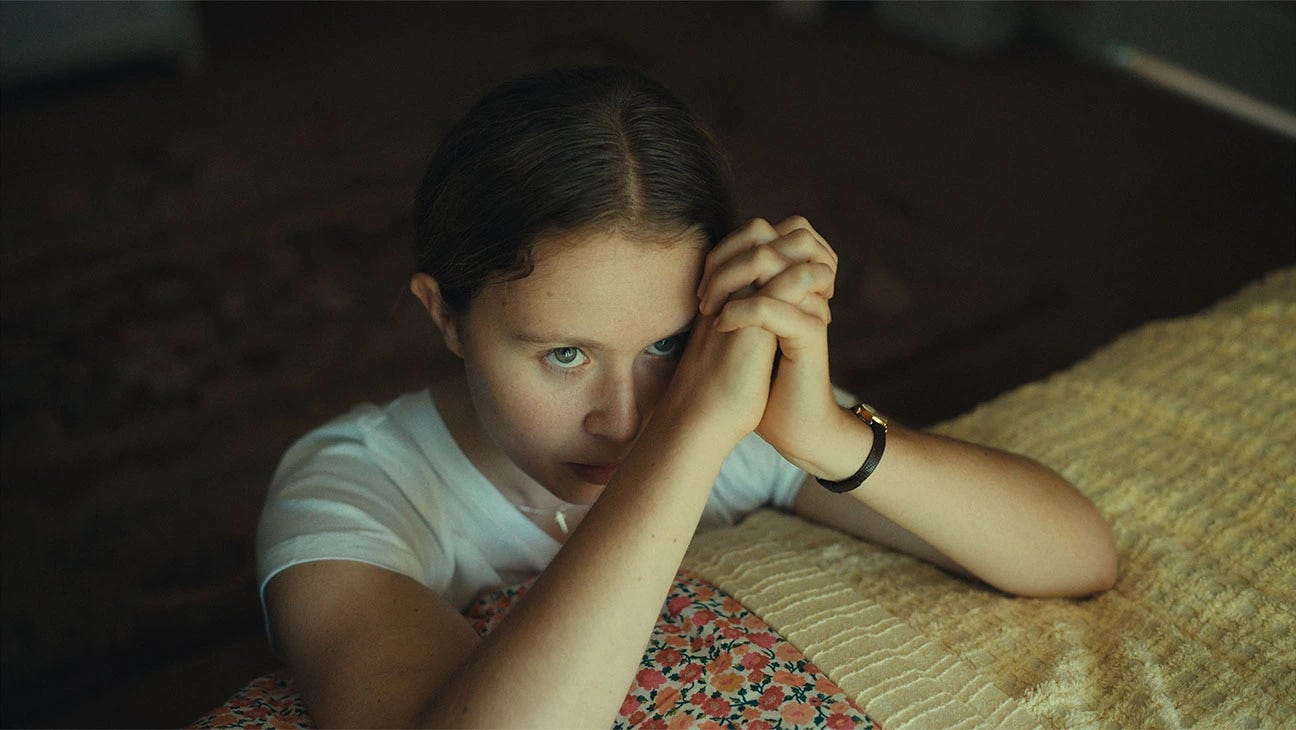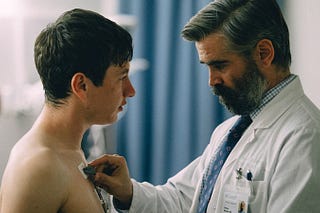
In Review: 'BlackBerry,' 'The Starling Girl'
This week, character actors come out to shine in a lively yarn about a mobile phone phenomenon and a fine drama about coming of age in tight religious community.
BlackBerry
Dir. Matt Johnson
121 min.
Since his brief appearance as a teenage Led Zeppelin obsessive in Almost Famous, and his follow-ups among the Apatow players in TV’s Undeclared and Knocked Up, Jay Baruchel has mastered a particular brand of comic discombobulation. His height and skinny frame give him the gait of an ungainly giraffe and his delivery makes him seem perpetually out of breath, as if he can’t quite catch up with the words spilling out of his mouth. He’s awkward yet exceptionally amiable, good at playing lovable nerds who are so habitually self-effacing and Canadian nice that they have trouble asserting themselves, even when they have the answers.
The chief pleasure of BlackBerry, a hugely entertaining yarn about the rise and fall of the once-popular mobile phone, is watching Baruchel, as tech super-nerd Mike Lazaridis, square off against Glenn Howerton as Jim Balsillie, a cutthroat businessman who is his exact temperamental opposite. Lazaridis is a hardware genius, most comfortable bearing down on the circuitry of a phone that can send and receive emails and texts, and flood remote networks without overloading them. For Balsillie, such wonders are just newfangled widgets that he needs to sell quickly and in immense quantities, and he can neither comprehend nor tolerate any delays in bringing them to market. As in most odd couple scenarios, the two men eventually bend a little in each other’s direction, but Baruchel and Howarton create a comic friction that energizes a modest film about a flash-in-the-pan phenomenon.
Working from Jacquie McNish and Sean Silcoff’s nonfiction book Losing the Signal: The Untold Story Behind the Extraordinary Rise and Spectacular Fall of BlackBerry, this clearly Canadian production starts with a ragtag collection of computer geeks in Waterloo, Ontario. As the film opens in 1996, Research In Motion (RIM) is a tiny tech firm operating out of a strip mall and waiting for returns on modems it’s shipped to U.S. Robotics, a behemoth that’s in no hurry to pay for them. With their bank credit stretched to the limit, Lazaridis and his partner Doug Fregin, played by co-writer/director Matt Johnson, are haplessly pitching a product called PocketLink, a mobile phone that doubles as an email device and a pager. The pitch is so stilted that no one can see that it’s a revolutionary idea.
Enter Balsillie, a no-nonsense executive who’s good at recognizing opportunity and seizing on weakness, which makes RIM an ideal target. As he barrels his way into the position of co-CEO, he brings a much-needed aggression and corporate mindset into a company full of distractible engineering geniuses. Balsillie understands the rush to get a device like PocketLink—but absolutely not named PocketLink—to consumers, so he lights a fire under Lazaridis and Fregin and gets results. In the space of one breathless cut to 2003, the BlackBerry has achieved market dominance and this tiny company is such a juggernaut that Balsillie is sniffing around NHL franchises and Lazaridis is getting decent haircuts.
The arrival of the iPhone leads to the inevitable reversal of fortune, but BlackBerry has a seat-of-the-pants urgency to it that never quits, even when things start to take a turn. The chemistry between Baruchel and Howerton is the primary engine that propels the film forward, but Johnson fills out the cast with a murderer’s row of character actors, including Michael Ironside in Starship Troopers mode as a blunt COO who whips the engineering team into shape, Cary Elwes as the unctuous glad-hander who runs the rival PalmPilot, Saul Rubinek as a phone company exec whose face crinkles in skepticism and contempt, and Rich Sommer as an engineer plucked from Google under legally dubious circumstances.
One important element that distinguishes BlackBerry from Air, the other lively piece of brand burnishment this season, is the downward curve in its second half, because tech innovations aren’t as long-lasting as a legendarily fashionable pair of basketball shoes. Lazaridis can only see the future to a point and Balsillie can only get away with slash-and-burn business tactics for so long. Johnson reserves most of his affection for Lazaridis, who’s almost tragically detail-oriented yet capable of learning from men like Balsillie that a successful operation can’t be built on ideas alone. We may know where BlackBerry is going, because we don’t have its phones in our pockets any longer, but the fate of Lazaridis’ soul is thrillingly up for grabs. — Scott Tobias
The Starling Girl
Dir. Laurel Parmet
116 min.
Early in The Starling Girl, a humbled teen stands before the small but tight congregation of a rural Kentucky church. Just returned from a place called Kings Valley, he talks about having been “cleansed” for some unspoken transgression and professes his newfound dedication to being clay in the hands of the divine potter. The kid’s own hands are calloused, having been worked hard for the transgression, if the whispers are true, of watching pornography on his father’s computer. “That’s why you gotta be so careful with technology,” seventeen-year-old Jem Starling (Eliza Scanlen) tells her youth group after the service. “It’s the easiest way for Satan to reach you.”
Raised a true believer, Jem is speaking in earnest. But she also already understands there’s other ways for Satan to reach the devout. She touches herself in the bath and at night, after her younger sister has fallen asleep. At church, she finds herself drawn to Owen (Lewis Pullman), a married youth pastor a decade her senior who’s returned from Puerto Rico with some new ideas for ministry he hopes to implement, if his father, Pastor Taylor (Kyle Secor), will let him. In Owen’s frustration, Jem sees a mirror of her own growing discontentment, which enters a dangerous new phase when the two begin an affair.
With her feature debut, writer-director Laurel Parmet explores some familiar territory with a sense of delicacy, insight, and specificity. The Starlings’ church is tight-knit but not isolated. Any walls it’s erected against the outside world are permeable. Jem might fear technology’s satanic powers but she uses YouTube to find appropriately reverent ideas for the dance routines. And that permeability is what allowed her father Paul (Jimmi Simpson) to join the community in the first place, seeking it out after getting sober and leaving the secular world and a promising career in music. But they’re walls, nonetheless, and those who break the rules within those walls can expect to pay a heavy penalty.
The Starling Girl refuses every opportunity to oversimplify its story. Without ignoring the imbalance of age and power, it depicts Jem as a willing participant in the affair with Owen, which has stirred desires in her that go beyond what Owen can fulfill. (Well played by Pullman, he’s dreamy on the outside but a weenie on the inside.) Parmet captures the appeal of living in a supportive enclave that provides its members with answers to every question, but also acknowledges the limitations of such a community. When Paul starts to slip off the wagon, everyone but Jem pretends not to notice and the emphasis on forgiveness masks a cruelty that goes beyond whatever happens at Kings Valley.
Parmet invests the film with a sense of unease that ratchets up as Owen and Jem’s affair grows in intensity. (There’s a scene about halfway through the film as intense as any horror movie moment you’ll see this year.) She also, wisely, trusts Scanlen’s remarkable performance to carry a lot of the weight. Most of Jem’s mounting doubt and spiritual evolution goes unspoken, but Scanlen makes clear what’s happening at every step, and why Jem feels she has to take each step even if it risks falling into the abyss. —Keith Phipps




















Me think seeing company rise and then come undone far more interesting, in dramatic terms, than "hooray for us" success story like We Bought A Shoe.
On related note, me have long wondered if future generations will listen to Jay-Z and have foggiest idea what "out the country but the blueberry still connect" refer to.
First 'Owning Mahowny' gets the retrospective treatment and then four stars for 'BlackBerry', what a glorious day for our country and indeed the world. Lifelong overexposure to the RIM story has made me especially resent Cineplex running the trailer incessantly for the past month -- The University of Waterloo is my alma mater, I've walked past the Lazaridis School of Business (of neighbouring Wilfred Laurier University) hundreds of times, played basketball at RIM Park, lived the ups and downs of the Jim Balsillie NHL saga in my adolescence and was subjected to story after story about Barack Obama's BlackBerry by local and national media. That said, Scott's excellent review and an obviously stellar cast have got my hopes up. "I said they're the best engineers in Canada" is already getting a lot of run among my cadre of Canadian engineers...